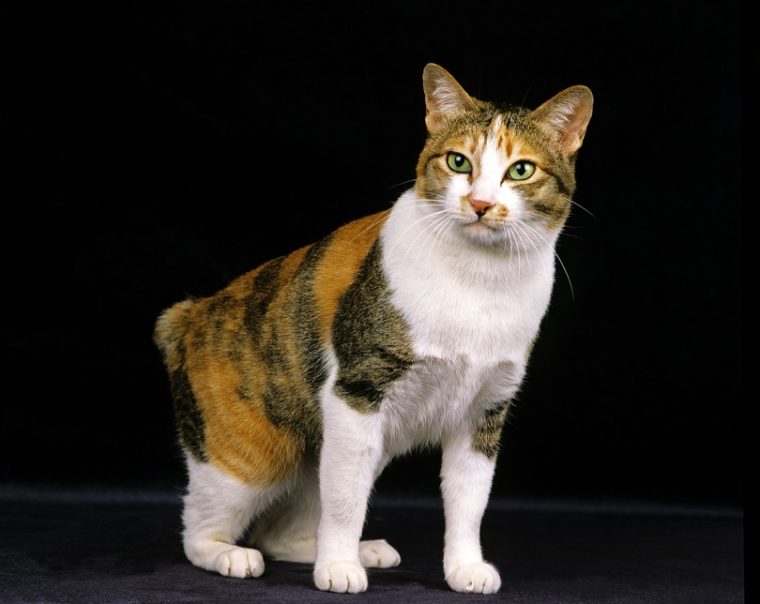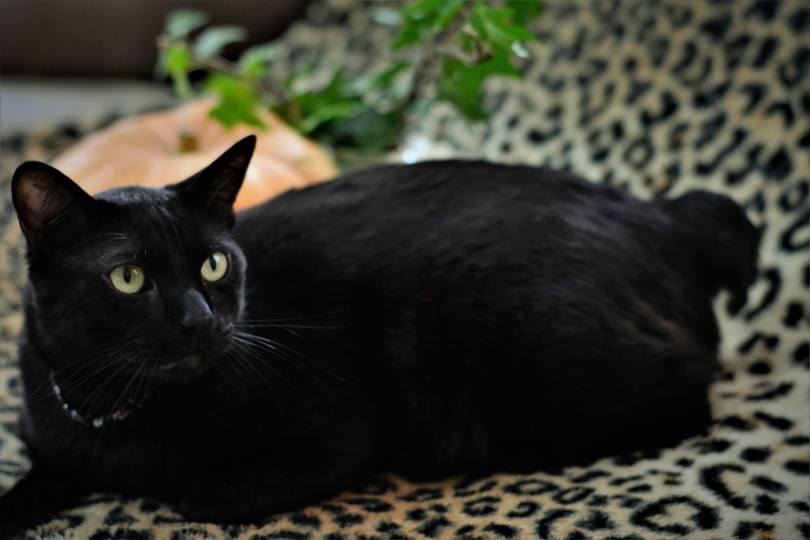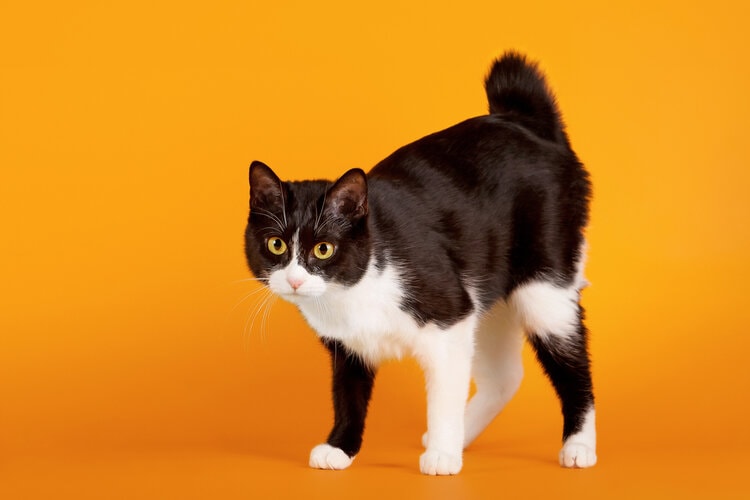
Click Below to Skip Ahead
Once the favorite pets of emperors, the Japanese Bobtail is an ancient breed, with a timeless personality and unforgettable charm. Their natural stub tails may be their most defining physical trait, but the Japanese Bobtail is also known for its adorable vocalizations and tendency to carry toys in its mouth.
Breed Overview
Height:
8-9 inches
Weight:
5-10 pounds
Lifespan:
9-15 years
Colors:
All solid colors, calico, tabby, tortoiseshell, solid and white
Suitable for:
Families with children, individuals, seniors
Temperament:
Friendly, playful, active, people-oriented, talkative
The breed deeply loves their human families and will insist—demand, even—to be included in all daily activities, no matter how boring. In this article, you’ll find fun facts and solid details about the Japanese Bobtail and what it’s like to live with a breed who used to sit at the right hand of emperors. Spoiler alert: they still think they’re in charge!
Japanese Bobtail Characteristics
Japanese Bobtail Kittens
Although the breed itself has existed for centuries, Japanese Bobtails are not as common in the United States. You may be able to find a Japanese Bobtail to adopt if that is your preference. Purebred and bobtail cat rescue groups are a good option, as well as your local animal shelter. Adoption costs will vary but are generally much less than the cost of purchasing a kitten.
Although this breed has no known inherited conditions, you should still seek out a responsible breeder who performs all preventative screenings and shots. Japanese Bobtail kittens mature quickly compared to many other breeds but it’s generally best to leave them with their mother until at least 12 weeks of age.
Temperament & Intelligence of the Japanese Bobtail
Japanese Bobtail cats are an endlessly active and playful breed. They adore their humans and can be a bit demanding in their desire for attention and affection. They are also considered intelligent cats who can learn tricks and love to play fetch.
Are These Cats Good for Families? 👪
The Japanese Bobtail is generally an excellent choice for a family pet. They are sweet, loving, and friendly, willing to spread their social circle to friends and guests if needed. Their energy and playfulness make them a good match for kids, who are usually game to keep playing as long as the Japanese Bobtail!
Small children should be supervised when interacting with the Japanese Bobtail to avoid unnecessary injury to either party.
Because they do become so attached to their owners, Japanese Bobtails are not a breed that will do well if left alone for long periods. They are also vocal and talkative cats, which is a slight consideration for owners who live in apartments. Their meowing is often described as “sing-song,” not as loud as a dog barking, but not quiet either.
Does This Breed Get Along with Other Pets?
No matter how many other pets are in the house, a Japanese Bobtail will likely assume they are in charge. If other pets disagree with this posture, you could be in for an unhappy animal household. Overall, Japanese Bobtails tend to do well with dogs, so long as both species are properly socialized and supervised.
Living with other cats can be a bit trickier for this breed. Japanese Bobtails famously bond very closely with their littermates and love to live with them. The bossy Japanese Bobtail may clash with non-related cats, however, depending on the personalities involved.
Playful Japanese Bobtails are likely to view small exotic pets as living toys and won’t make good housemates for these animals.
Things to Know When Owning a Japanese Bobtail:
Ready for a Japanese Bobtail to bring good luck to your house? Here are all the important things you need to know before you welcome this breed into your life.

Food & Diet Requirements 
Japanese Bobtails love to eat and are especially fond of treats. While they burn a lot of calories due to their activity level, you’ll still need to measure out their food carefully to avoid weight gain. Your veterinarian can help you determine how many calories per day to aim for.
These cats should do well on any quality, nutritionally-balanced feline diet. Commercially prepared or homemade foods are both suitable options. However, homemade diets should be formulated with the assistance of a veterinarian to ensure they contain all essential amino acids, vitamins, and minerals.
Exercise 🐈
This is an athletic, physically fit breed. Japanese Bobtails are fast, energetic, and excellent climbers. They are playful by nature and love interactive toys and chasing balls. To keep them fit and happy, Japanese Bobtails need daily exercise and active playtime.
Because they love to interact with their people, playing with a Japanese Bobtail can be a great opportunity to socialize and bond with your cat. Without regular physical and mental stimulation, these cats can become bored and develop behavioral issues.
Training 🧶
Japanese Bobtails are highly intelligent and motivated cats. They often learn their names quickly and can be taught to play games like fetch. They are definitely food motivated, which makes training them simpler.
Positive reinforcement training methods are most effective for the Japanese Bobtail. Using food rewards and a clicker is an excellent way to teach simple commands and tricks. Just be sure to factor in any training treats to your cat’s daily calorie count to avoid overfeeding.

Grooming ✂️
Japanese Bobtails come in both long and short-coated varieties. Neither variety has an undercoat, so the breed doesn’t shed heavily. This trait also makes their grooming needs fairly simple. Weekly brushing is usually enough to remove loose hair and prevent any tangles.
Other than brushing, you’ll need to keep your Bobtail’s nails trimmed and ears cleaned. Perform regular dental care by brushing your cat’s teeth or using other dental products recommended by your veterinarian.
Health and Conditions 🏥
Overall, Japanese Bobtails are considered a healthy breed. They are not prone to any known inherited or genetic health conditions. To keep a Japanese Bobtail healthy, perform regular vet checkups and preventative medicine such as shots, blood work, and parasite control.
Japanese Bobtails are susceptible to feline infectious diseases, like all cats. Some common medical conditions that may impact these cats, but are not unique to this breed, are listed below.
Serious Conditions:
Many purebred cats are prone to heart disease, most often a condition called hypertrophic cardiomyopathy.
Kidney disease is another common feline health concern.
Obesity, often seen in food-loving Japanese Bobtails, can lead to more serious medical conditions such as diabetes.
All young, male cats, including Japanese Bobtails, are at risk of lower urinary tract disease and blockage.
Minor Conditions:
Dental disease is common in many cat breeds.

Male vs Female
Male Japanese Bobtails are often visibly larger than females. Female Bobtails generally don’t weigh more than 8 pounds while males can weigh up to 10. In terms of personality, the two genders are similar, especially when they’ve been spayed or neutered.
Unneutered males may spray urine and are more likely to be aggressive and territorial, especially with other cats. Unspayed females will experience a heat cycle about twice a year. During this time, they may be extra vocal and short-tempered.
If you’re not planning to breed your Japanese Bobtail, having them spayed or neutered is recommended for optimal health.
3 Little-Known Facts About the Japanese Bobtail
1. They are one of the oldest breeds of cats.
The Japanese Bobtail is portrayed in ancient Japanese wood carvings and paintings, dating back to the 6th century. It is thought that the breed occurred naturally, with no human intervention. One of their earliest jobs was keeping rodent pests out of the silkworm barns, helping the Japanese silk trade to flourish.
2. No Japanese Bobtail tail is the same.
Every Japanese Bobtail has a short, kinked tail but the similarities end there. Every cat has a tail as unique as fingerprints are for humans. Interestingly, the short bobtails have the same number of spinal segments as a full-sized tail.
3. They are considered lucky.
In their home country, Japanese Bobtails are considered good luck charms, which ensure prosperity and happiness for their owners. The tri-color calico bobtails, nicknamed Mi-ke (“mee-kay”), are considered the luckiest of all.
Final Thoughts
Japanese Bobtails expect to be in charge and the center of attention wherever they go. If you’re interested in a pet cat because you don’t feel you’re home enough to care for a dog, the Japanese Bobtail is not the breed for you. They love to snuggle up beside you, but you’ll need to burn off some energy first! Their tails may be short, but their lifespans aren’t, so make sure you’re prepared for the commitment of caring for a Japanese Bobtail before bringing one into your life.
See also:
Featured Image Credit: slowmotiongli, Shutterstock









